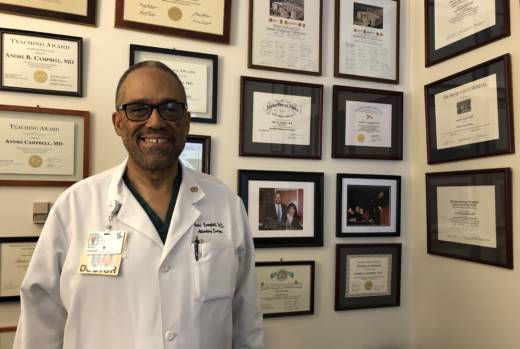This interview has been edited for brevity and clarity.
At the press conference outside the hospital on Tuesday, you talked about the frequency of gun violence, but the lack of consistent media interest. What were you thinking as you said that?
Dr. Andre Campbell: There is an epidemic of violent crime involving guns in the United States. So the thing that I was expressing is that on a daily basis we have folks who were shot. I was wondering out loud if this is related to the fact it’s a YouTube situation versus a situation where we have the poor folks: the homeless, people who are maybe not so well off and don’t work at YouTube. They get hurt because every day there are people who are getting shot and hurt.
Can you tell us about a typical day in the emergency room at ZSFG?
Campbell: We work in a very busy Level I trauma center at the Zuckerberg San Francisco General Hospital. Probably 80 percent of people we see are blunt trauma — that means related to car accidents, falls and bike accidents, those kind of things. And about 15 to 20 percent are penetrating trauma — that’s stab wounds and gunshot wounds and those kind of things.
How do you process what you do every day when you’re seeing that kind of literal trauma?
Campbell: First of all, let me just say it is an honor and a privilege to be a physician. People allow us to do things to make them better.
Of course I see tough things. So the first thing I do when someone dies and it’s not expected is, I’ll stop for a moment and I’ll have everybody pause and I say, ‘Let’s have a moment of silence honoring the life that we just lost.’ The second thing I usually do then is talk to the social worker, and the social worker will put me in contact with the family. Then I’ll sit down in a quiet room and I’ll describe to them what happened. I describe to them I’ve done everything I had to do to save the life with the whole team and we could not save their relative.
When you do what I do, see people die fairly regularly, you recognize how fortunate it is to be alive and to be able to make people better.
What about when you go home and you’ve had a day like that? What do you do?
Campbell: I go on home, I listen to some jazz music, or turn on the TV and look at an old movie. The other day I had a bad day and I was watching “Space Cowboys,” or I’ll watch a James Bond movie.
But it’s hard. I mean there are times that you cry. It hurts. You know, we are human beings like everybody else.
I think a lot of people are frustrated with seeing this level of violence and feel helpless as to what they can do about it. What are you doing as a hospital to address it?
Campbell: We have a support system that has been built into the framework of the hospital that includes a trauma recovery center. There’s actually a great program started by one of my partners called the Wraparound Project, where victims of violent crimes are enrolled and given support services.
There are all kinds of violence intervention programs that go on around the country. There are social workers involved, there are therapists involved, there are counselors involved.
Out of the Sandy Hook massacre there was a program that was started through the American College of Surgeons called Stop the Bleed. We activate innocent bystanders of gunshots or incidents of trauma where they can have the basic skills to [stop major bleeding]. The course takes an hour to teach: It’s putting pressure on bleeding, packing a wound and applying a tourniquet. Right now, we’ve trained over 200,000 people. We’ve trained about 20,000 teachers to do that, and our job is really to train the entire population of the United States. There have been classes all over the city and county of San Francisco.
Anything else you’d like to add?
Campbell: I want to thank your listeners for being interested in this problem, and to help us. This is going to be a problem that not only trauma surgeons need to speak up about, but other types of people from all walks of life. We need teachers, we need police officers, we need firemen, we need the politicians. This is a terrible thing that happened. My heart goes out to the victims. We need to change the discussion. We need to move this forward, and we need to make a difference.
